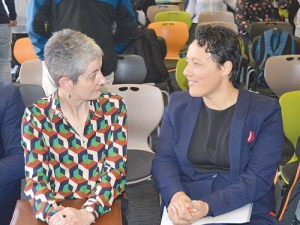Disunity is death
OPINION: Staying with politics, with less than nine months to go before the general elections, there’s confusion in the Labour Party when it comes to working with the divided Maori Party.
 Labour MP Kiritapu Allan (right) with new MPI deputy director general policy and trade Penny Nelson at the ETS forum.
Labour MP Kiritapu Allan (right) with new MPI deputy director general policy and trade Penny Nelson at the ETS forum.
The Government says it will be important to set the right 2050 target in its Zero Carbon Bill.
Labour MP and primary production committee member Kiritapu Allan says the Government recognises the target has to be “something that everybody can get behind, live with and work towards achieving together”.
Speaking at a New Zealand Institute of Agriculture and Horticultural Science (NIAHS) forum in Wellington this month, Allan said the Government is looking for “an enduring consensus on this target to provide the certainty the sectors have been asking for”.
“With this Act we aim to be clear, honest and fair to farmers about what will be expected of them in the future.
“Everybody has a role to play in meeting these future targets. We need to work with farmers and the sectors to share best practice and support farmers through this transition.”
By means of the Zero Carbon Act, the Government will also set up an independent climate change commission in 2019 to advise on climate change issues. An interim climate change committee has been set up as a precursor and this is providing analysis on how surrender obligations could best be arranged if agricultural methane and nitrous oxide emissions enter into the NZ emissions trading scheme (ETS).
Allan says the committee will give evidence and analysis of the full range of policy options to reduce emissions from the agriculture sector.
“This will include, but is not limited to, the pricing of agricultural emissions in the NZ ETS.
“In providing their analysis and recommendations, the committee will consider the Government’s objective for a just transition.”
‘Just’ land-use transition
Labour MP Kiritapu Allan says the Government sees reducing NZs agricultural greenhouse gas emissions as an important and necessary step towards a productive, sustainable and inclusive economy.
Achieving this will require a just transition to more sustainable land use, she says.
“Farmers are facing demands to lower their greenhouse gas emissions and improve water quality, biodiversity, biosecurity and animal welfare outcomes.”
To align these objectives, various approaches and tools, such as a One Farm Plan and Overseer, are being developed and improved. This has opportunities for farmers and producers.
“An intensive, volume-driven growth model has created economic and environmental sustainability concerns.
“Continuing to grow wealth this way is no longer viable. By focussing instead on proving our strong environmental credentials, we can add value to our products and ensure their premium status. By diversifying and adding value, we can also boost our resilience and lessen exposure to swings from commodity prices.”
Global trade has been thrown into another bout of uncertainty following the overnight ruling by US Supreme Court, striking down President Donald Trump's decision to impose additional tariffs on trading partners.
Controls on the movement of fruit and vegetables in the Auckland suburb of Mt Roskill have been lifted.
Fonterra farmer shareholders and unit holders are in line for another payment in April.
Farmers are being encouraged to take a closer look at the refrigerants running inside their on-farm systems, as international and domestic pressure continues to build on high global warming potential (GWP) 400-series refrigerants.
As expected, Fonterra has lifted its 2025-26 forecast farmgate milk price mid-point to $9.50/kgMS.
Bovonic says a return on investment study has found its automated mastitis detection technology, QuadSense, is delivering financial, labour, and animal-health benefits on New Zealand dairy farms worth an estimated $29,547 per season.
OPINION: Staying with politics, with less than nine months to go before the general elections, there’s confusion in the Labour…
OPINION: Winston Peters' tirade against the free trade deal stitched with India may not be all political posturing by the…